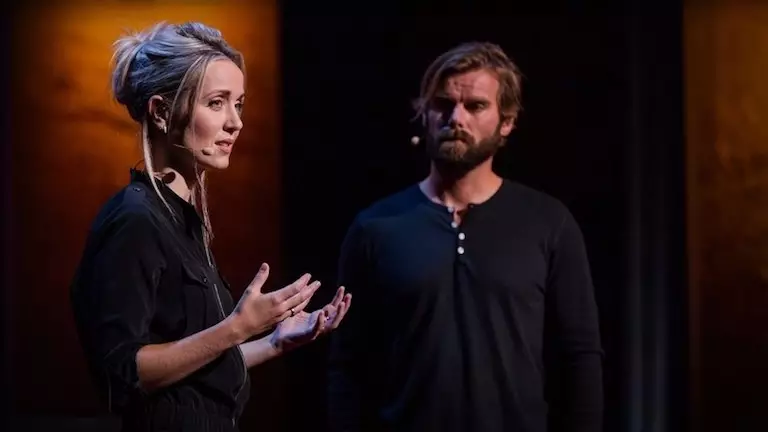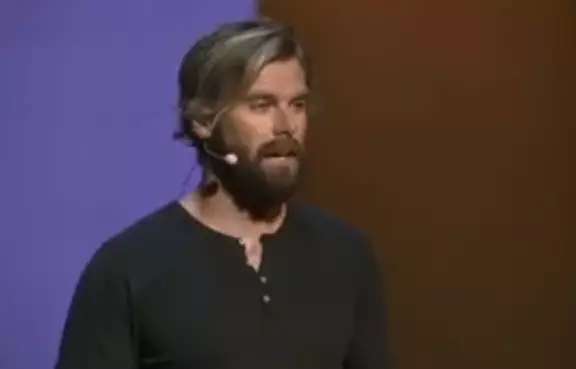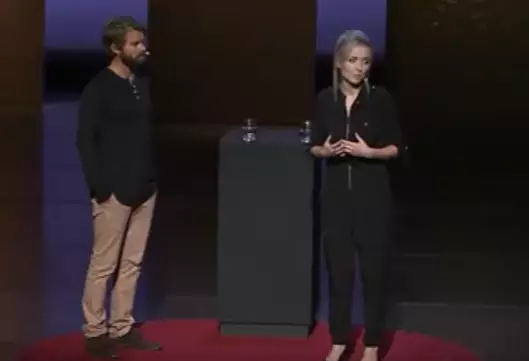
In Iceland in 1996, sixteen year old Thordis Elva and Tom Stranger had been dating for a month when they went to a school dance together.
After Thordis got too drunk, Tom took her home and raped her.
They split up soon after, but that's not where their story together ends. In fact, over 20 years later it still hasn't ended.
Rape is horrifically common. In England and Wales, 85,000 women and 12,000 men are raped every year. That's 11 rapes an hour.
A truly horrible statistic - and one that is completely needless. It goes without saying that no one should ever be raped and no one deserves to be raped.
But while rape is a common story, Thordis and Tom's isn't.
Advert
Watch them explain in their own words here...
After the event, Thordis wallowed in shame, and Tom ignored her and then went home to Australia.
It took Thordis a while to realise she had been raped.
"Despite limping for days and crying for weeks, this incident didn't fit my ideas about rape like I'd seen on TV," says Thordis. "Tom wasn't an armed lunatic, he was my boyfriend, and it didn't happen in a seedy alleyway, it happened in my own bed."
Attitudes towards sexual assault were different then; it was only five years after the UK changed the law to recognise men could rape their wives.
Advert
Back home in Australia, Tom convinced himself it was sex and not rape.
"It's important to now state that I didn't see my deed for what it was. The word rape didn't echo around my mind as it should have," says Tom.
Although deep down, he knew he did something immeasurably wrong, he says he stuck tight to the idea he wasn't a bad person.

Many still feel rape isn't taken seriously enough. Credit: PA Images
Advert
Thordis, meanwhile, was headed straight for a nervous breakdown. She was angry and filled with shame, and this continued for years.
"Girls are taught that they get raped for a reason," she explains. "Their skirt was too short, their smile too wide, their breath smelled of alcohol, I was guilty of all of those things so the shame had to be mine. It wasn't my skirt, it wasn't my smile, it wasn't my childish trust. The only thing that could've stopped me from being raped that night is the man who raped me - had he stopped himself."
Wanting to reach out to Tom, she sat down and wrote a letter when she was 25 - nine years after he raped her. Whether or not he deserved forgiveness, she knew that she deserved peace.

Tom is open about his sinister past. Credit: PA Images
Advert
It started an eight-year correspondence that was hard, for both of them, going from gut wrenching to healing.
But it didn't bring closure for Thordis.
Writing emails and letters was the beginning of a long dialogue but they eventually decided they needed to meet up. They chose Cape Town as a point in the middle of Australia and Iceland.
Healing and atonement is a huge part South African history, explains Tom and they felt that when they were there.
"The seismic effects of sexual violence were spoken aloud and felt, face to face," he says, explaining that the week they spent together, they experienced soaring clarity and unexpected liberating laughter.
Thordis talks of revenge - of wanting to hurt Tom as deeply as he had hurt her - but realising that it wouldn't help her.

Thordis now gives talks about the world. Credit: PA Images
Advert
After returning from Cape Town, she and Tom wrote a book. She says it is a story that people need. It's unusual - and possibly unprecedented - for two people to speak, for such a long time, about one of them raping the other.
The terms 'victim' and 'rapist' are part of the problem, argues Thordis.
"They can also be dehumanised in their concepts," she explains. It's easier to file a "victim" away as a broken person, who is less than they were before they were raped, and it's too easy to see a rapist as an inhuman monster.
"We need to recognise the humanity of those who commit "inhuman" acts."
For Tom, he had to confront a dark part of himself and not only think about his actions from 20 years ago, but his feelings towards her and women in general.
"I felt deserving of Thordis' body," he explains.
He says that although he had positive relationships with women in his life and good examples, there's an underlying notion that women are of less intrinsic worth than men.
For him, owning what he did brought healing. "It was only me making choices in that worth. When you really own up to your culpability, it's called the paradox of ownership. I thought I'd buckle under the weight of responsibility."

Statistics show rape is still common in the UK. Credit: PA Images
But although its clear he was deeply affected, he didn't buckle. In admitting to himself that he had raped Thordis back when he was 16, he gained clarity over himself.
"I did hurt this wonderful person," he says. "I am part of the large and shockingly everyday group of men who have been sexually violent towards their partners."
Very few people would publically admit in a TED talk that they had raped someone - and it's emotional to watch. Admitting to her what he had done was obviously a transformative experience for him.
"Saying to Thordis, I raped her meant the blame transferred from Thordis to me," he says.

The two now give talks together on rape. Credit: TED
And that's the crux of the matter. Even though Thordis had been taught that rape could be the fault of the victim, it was important for her to hear that it wasn't her fault at all. It was Tom's.
Thordis says the way they went about healing is not a formula others should necessarily follow. But she says that the privilege of having a voice comes the responsibility of using it and it's important to her to share their story.
She urges more men to add their voices to the on-going conversation about rape. Giving and attending talks and workshop about sex and rape, she has noticed that the attendees of events are always women. Sexual violence isn't a women's issue, she maintains, it's a human one. The majority of sexual violence against both men and women is perpetrated by men, and yet their voices are under represented in the discussion.
Words Laura Hamilton
Topics: Sexual Assault, Weird